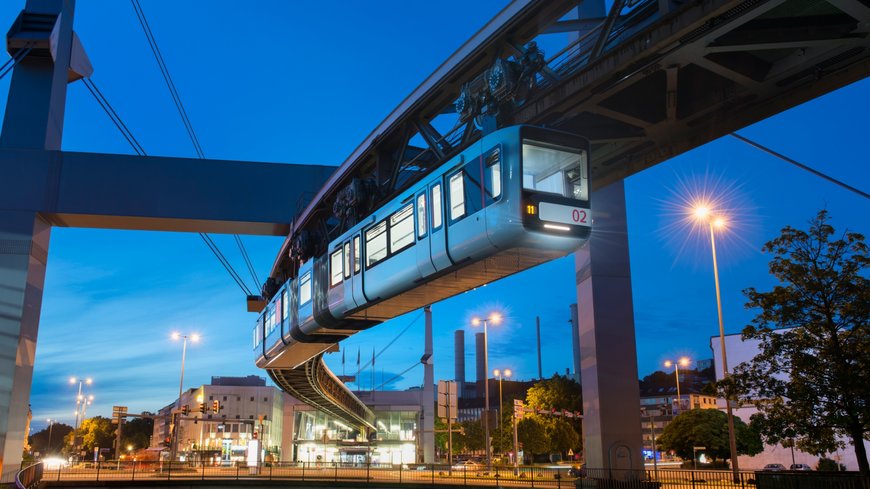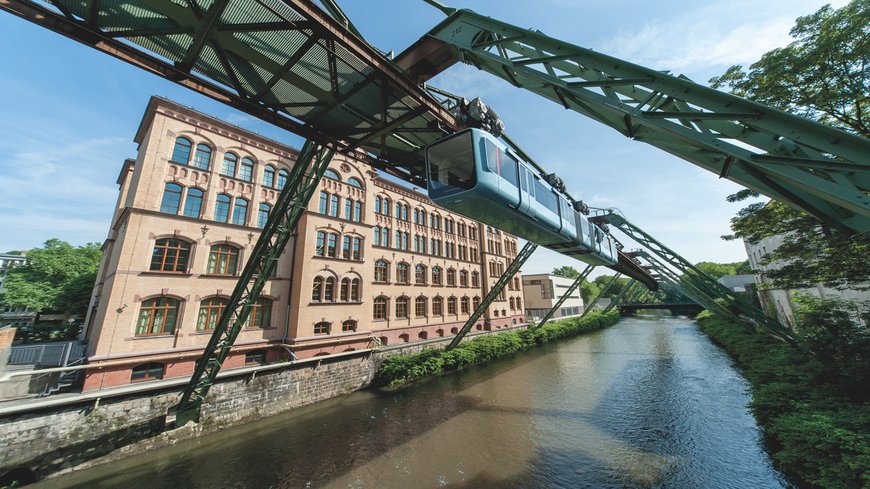railway-international.com
04
'21
Written on Modified on
CITY OF WUPPERTAL’S SUSPENSION MONORAIL RESUMES DAILY OPERATION: RETROFIT MEASURES FROM KIEPE ELECTRIC SUPPORT OPERATIONAL STABILIZATION
Kiepe Electric GmbH, based in Düsseldorf, and its customer Wuppertaler Stadtwerke (WSW) have achieved a key objective: The suspension monorail in Wuppertal will resume service on July 31, 2021. The partners have created the conditions for regular operation of the suspension monorail with increased passenger comfort.

This was achieved, among other things, by a retrofit program set up and implemented by Kiepe Electric and WSW. In this way, the period during which WSW decided to partially shut down the monorail was used to find a technical solution.
Alexander Ketterl, Managing Director of Kiepe Electric, Dusseldorf, comments on the achievement: “A high level of transparency towards the customer is our key objective in each of our worldwide projects, and I can say that we lived up to this aspiration in the unique Wuppertal suspension monorail project. We are responsible for the efficient reworking of the vehicles, partly on the basis of changed requirements, and implemented this in close coordination with our customer WSW. The second part of the series retrofit will begin shortly.” In addition, Kiepe Electric has supported WSW at all times in clarifying the alleged wheel issues in the wheel-rail system as the reason for the break in service.
Efficient retrofit process initiated
Kiepe Electric has successfully used the partial decommissioning of the monorail fleet by WSW from August 2020 to initiate and set up a retrofit process. The processing will continue, and the duration will depend on the vehicles available in the future.
In retrofit phase 1, Kiepe Electric staff has been implementing measures for operational stabilization and improved availability in Wuppertal-Vohwinkel since February 2021. This work was feasible even in limited spaces and included technical tasks, work in the passenger and driver compartments, and updates to the vehicle software that is important for vehicle availability. Kiepe Electric will support the start of operations from July 31, 2021, by providing personnel on site, among other things, in order to be able to quickly assist WSW in eliminating any malfunctions that may occur.
Retrofit phase 2 on the horizon
In retrofit phase 2, a full retrofit of all 31 vehicles will be carried out with specialized partners from late summer 2021. As a result of this work, there should be no restrictions on regular operation of the monorail, and all partners involved have based their process planning on this. The vehicles are to be overhauled continuously and successively as part of a longer-term process. Four prototype vehicles have already been converted in order to rehearse and verify the installation and conversion. This was done in close coordination and with the approval of WSW. In retrofit phase 2, topics such as air-conditioning technology, refurbishment of the passenger compartment and driver’s cab, and bonding of the roof will be implemented.

Solutions for wheel issues enables vehicle operation
WSW had identified increased wear and tear on the wheels of the monorail as the decisive factor for the weekday suspension of monorail operations from August 2020. Kiepe Electric has fully supported the search for the cause of this in coordination with the WSW management. In this process, Kiepe Electric has been able to make an important contribution to finding the cause of the suspected increased wheel wear by means of an exclusion procedure. From Kiepe Electric’s point of view, however, the latest investigations into the cause have given no indication that the wheel wear and the resulting lack of wheel availability, which ultimately led to the decommissioning, were due to services provided by Kiepe Electric or the vehicle design.
Speed of circulation to be increased
A maximum speed of 60 km/h for the monorail is still being aimed for. Kiepe Electric, WSW and other suppliers involved are currently working continuously on a solution. At present, however, the maximum travel speed is limited to 40 km/h by the Technical Supervisory Authority (TAB). This is due to the safety measures taken after a vehicle touched the scaffolding in May 2017. In 2022, the partners want to develop a final solution for reaching the maximum speed. For this purpose, a driving profile will be calculated in close coordination with WSW that allows the maximum speed of 60 km/h on straight sections of track or in curves with a sufficiently large curve radius.
www.knorr-bremse.com

